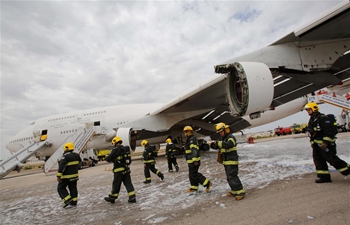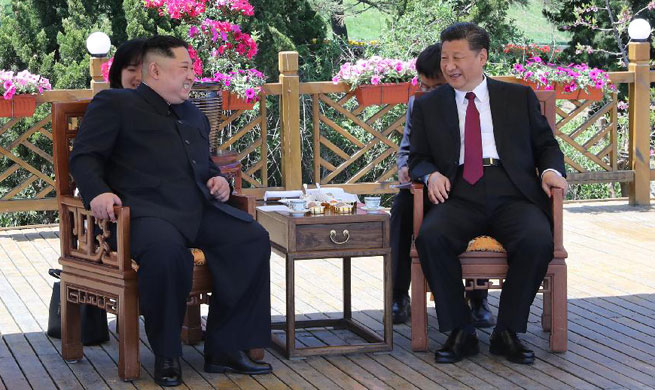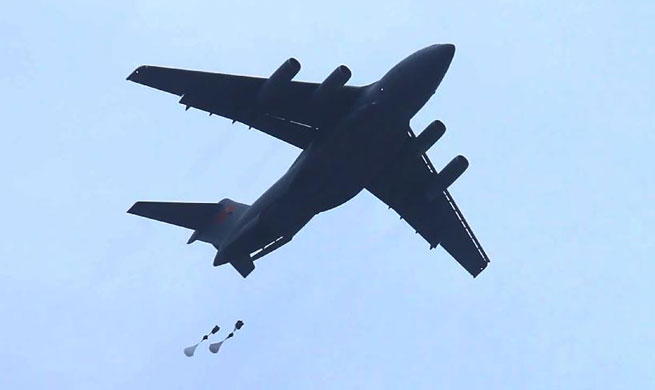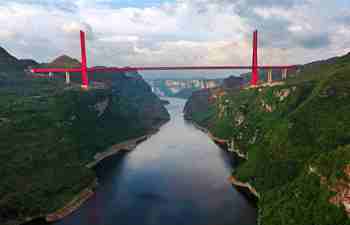by Keren Setton
JERUSALEM, May 8 (Xinhua) -- U.S. President Donald Trump announced on Tuesday that he would be withdrawing from the Iran nuclear deal signed in 2015.
The American leader said he would impose sanctions on Iran that were lifted as a result of the Joint Comprehensive Plan of Action (JCPOA).
The other powers who are parties to the deal said they would continue to uphold it.
After years of campaigning against Iranian nuclear aspirations and the deal, Israeli Prime Minister Benjamin Netanyahu can easily see Trump's decision as a personal achievement.
The deal, which Netanyahu called "horrible" earlier this week, gave Iran economic relief in return for scaling down its nuclear program.
Speaking minutes after the American announcement, Netanyahu called the decision "a brave and correct" one, adding that "the Israeli people should appreciate the decision."
Iran has repeatedly called for Israel's destruction and in recent weeks tensions have been rising between the arch-enemies.
Earlier this year, the Israeli military said it shot down an armed attack drone that violated Israeli airspace. In response, Israeli aircraft attached the launching site in Syria which was reported to be an Iranian military base.
There have also been reports that Israel has carried out several other airstrikes against Iranian targets in Syria. These reports have not been confirmed or denied by Israel.
While the world was waiting from Trump to deliver his speech, the Israeli military announced it had detected "irregular activity of Iranian forces in Syria" and instructed local authorities to prepare bomb shelters in case of any Iranian offensive.
But for Iran to take action against Israel at the heels of the American announcement would be a brazen move.
"They will try to surprise Israel," said Prof. Efraim Inbar, President of the Jerusalem Institute for Strategic Studies, "I do not think they will react immediately, especially since Israel is seen has having American back-up."
"Iran will be very careful to do something that could result in a war," said Dr. Menahem Merhavy, an expert on Iran at the Harry Truman Institute at the Hebrew University in Jerusalem.
"It cannot afford to do that, especially now after Trump's statement, much more than before," Merhavy told Xinhua.
"I expect the Iranians to be very careful," said former Israeli Prime Minister Ehud Barak on Israel's Channel 2 news broadcast.
Yet, shortly after the decision to re-impose crippling sanctions on Iran, its President Hassan Rouhani said he had ordered Iran's atomic organization "to start enriching uranium more than before...in the next weeks."
With American backing, Israel retains a steadfast, regional power position in the region.
"Israel's deterrence is increasingly stronger," Inbar told Xinhua.
Last week the Israeli premier revealed thousands of Iranian documents that he said were seized in an intelligence operation in Tehran. The discovery was of "Iran's atomic archive" as was coined by Israel.
In his Tuesday announcement, Trump referred to the presentation. It was a testament to the influence Netanyahu currently has in the Oval Office.
"This was obvious from the subtext," Prof. Inbar said, "Israel has been nurturing the Americans for years..., helping Trump to reach this position."
According to Dr. Harold Rhode, a fellow at the Jerusalem Center for Public Affairs, the Israeli leader is not the main reason behind the American withdrawal from the JCPOA.
"The whole process has culminated in this," Rhode told Xinhua, "Certainly Netanyahu played a part - they think very much alike and understand each other."
Just minutes after Trump signed the executive order ending U.S. involvement in the pact, unconfirmed reports from Syria said that Israel had attacked an Iranian military base in the country.
There is anticipation in Israel for an Iranian response, but it may not come immediately.
Iran may also choose to use its proxies in Lebanon and Syria to launch an attack without directly involving themselves.
Statements made just recently by Netanyahu and other government and defense officials suggest the Israeli response to such an attack will be harsh.
"I have little doubt that if Israel is attacked by Iran or by Iranian proxies, that Israel will take care of this problem," Rhode said, "I would not want to be the Iranian leadership if Israel chooses to respond."
















